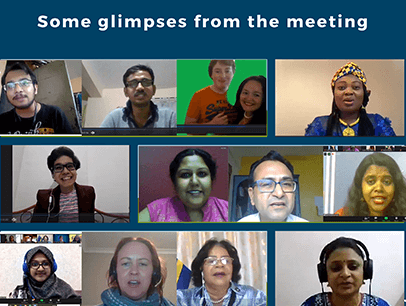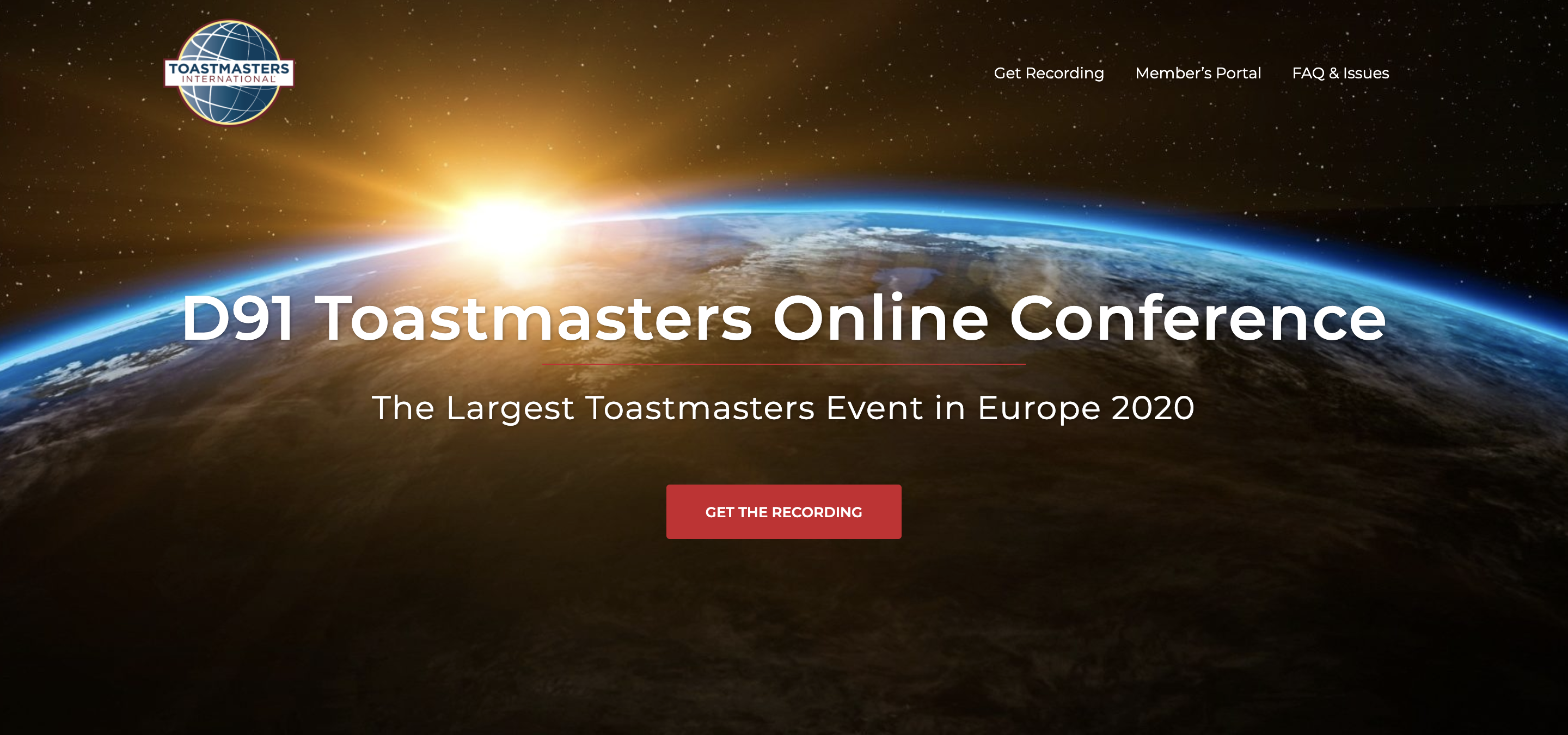 The landing page of District 91’s 2020 online conference, which now offers a recording of the event for those who missed it.
The landing page of District 91’s 2020 online conference, which now offers a recording of the event for those who missed it.It was a big day in May 2020 for District 91 (South United Kingdom), as its annual District Conference was about to commence. Preparations had begun six months earlier, and the event was to be held in a prominent hotel in London. Yet, the global pandemic altered these plans.
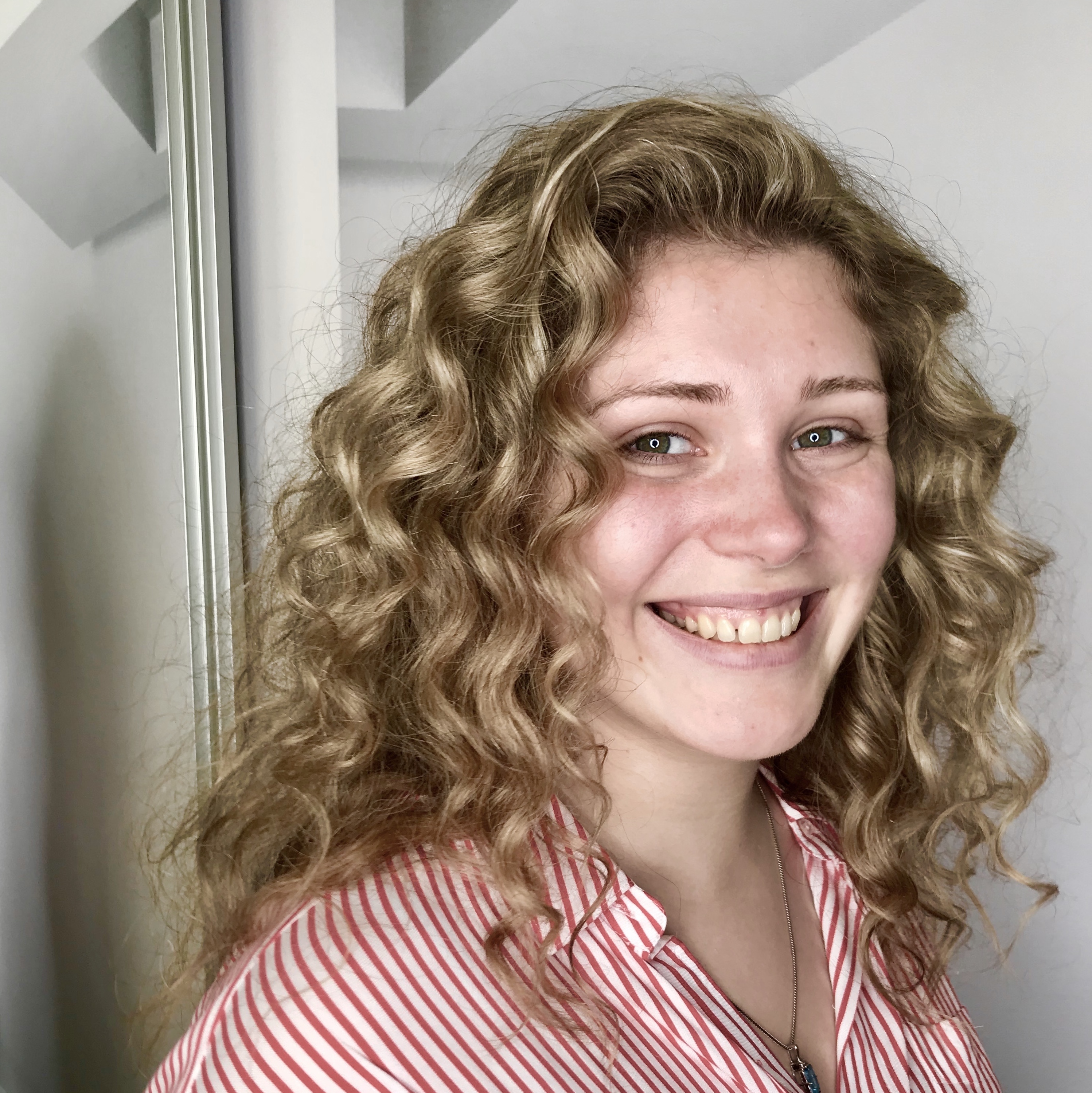 Diana Robertson was the District 91 Conference Director in 2020.
Diana Robertson was the District 91 Conference Director in 2020.When the lockdown was announced, everything that could go wrong for the event did. Ticket sales plummeted, attendees claimed refunds, all keynote speakers canceled, and the prepaid venue refused to arrange a refund. It was a disaster. A month before the conference, the District canceled the in-person event, refunded registrations, and started planning an online conference. The team didn’t have much initial success and almost lost hope when something unbelievable happened: Instead of diminishing in size, the event grew to 840 attendees—three times the originally planned number. Not only that, but attendees came from 33 countries.
It felt like every piece of the puzzle finally clicked together. As a result, a conference that was ostensibly doomed to failure ended up being a tremendous success.
So how did we turn our event around from disaster to success?
Tip #1: Put the Value for Your Attendees First
Choose relevant topics
Before setting the program, ask yourself: Who are my attendees? What do they like? What would be valuable for them?
If you have a mixed audience—such as new members, non-serving members, club officers, and District leaders—structure your event so that it will be of value to everyone. For instance, if you have an event consisting of 50% club members and 50% club officers, find broader topics, such as improvising communication, rather than holding a workshop about growing club membership.
Look for topics that are interesting for everyone: public speaking tips from pros, leadership, improvisation/Table Topics, debates, humor, networking, interpersonal communication, etc. Just make sure that your topics are centered around self-development, communication, and leadership to maximize value for everyone.
“Attendees need to feel the event will help them become a slightly better version of themselves, which is why it is crucial that you can guarantee the quality of your workshops.”
Our D91 Conference had a total of 11 workshops and keynotes including, “How to Answer Tough Questions,” “The Power of Listening,” “How to Use Networking to Achieve Your Dreams.”
Guarantee quality
Attendees need to feel the event will help them become a slightly better version of themselves, which is why it is crucial that you can guarantee the quality of your workshops.
Don’t be afraid of inviting prominent figures. You’d be surprised how many people are willing to present at your stage for free even if they’re non-Toastmasters. The famous speechwriter Simon Lancaster happily agreed to present at the D91 Conference. So did Toastmasters Past International President Lark Doley; Golden Gavel holder and TED Talk presenter and sound expert Julian Treasure; 2001 World Champion of Public Speaking, Darren LaCroix, and many other fantastic communication experts.
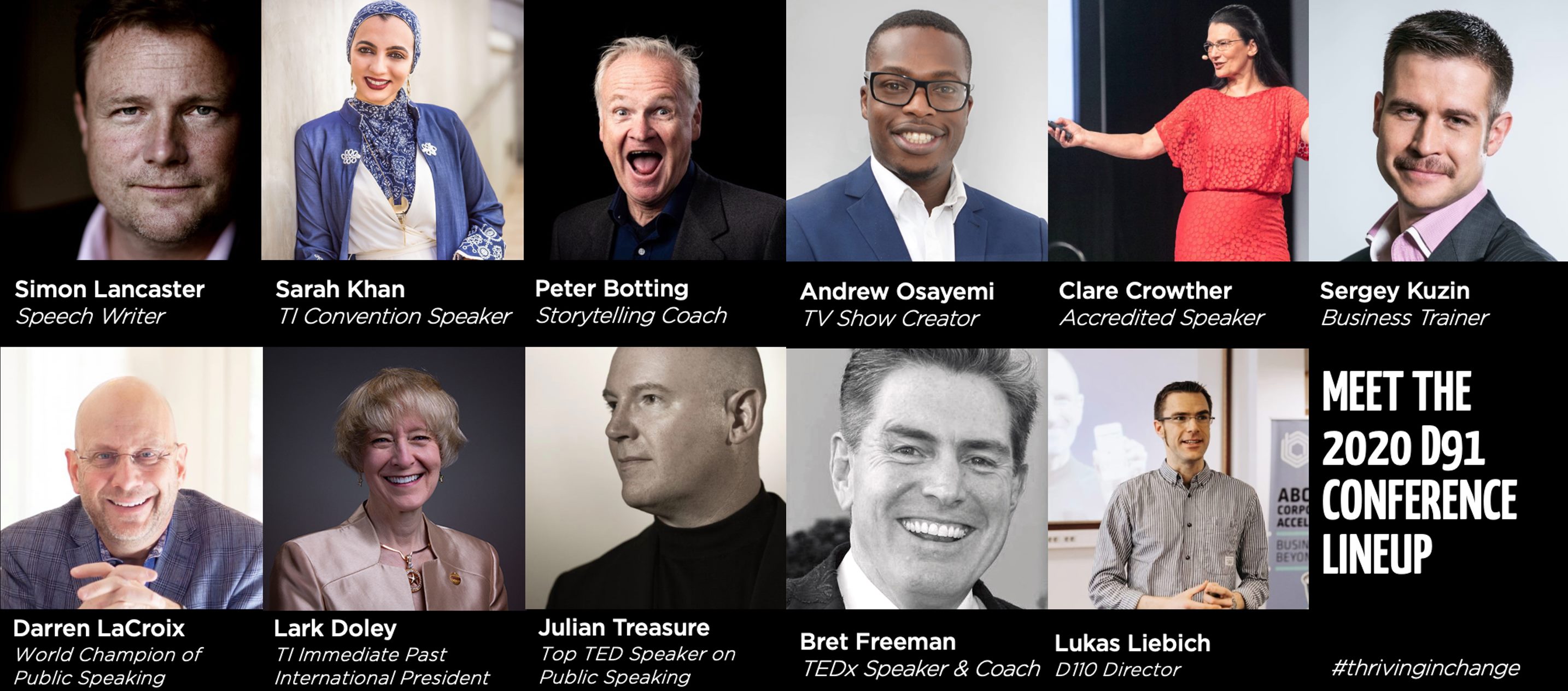 The District 91 conference team invited prominent figures to speak at their online event, including Toastmasters Past International President Lark Doley, 2020 Golden Gavel Julian Treasure, 2001 World Champion of Public Speaking Darren LaCroix, and many others.
The District 91 conference team invited prominent figures to speak at their online event, including Toastmasters Past International President Lark Doley, 2020 Golden Gavel Julian Treasure, 2001 World Champion of Public Speaking Darren LaCroix, and many others.This doesn’t mean you shouldn’t give the opportunity to less experienced speakers. Accept applications from everyone, but have strict selection criteria to bring the most benefit your attendees.
Tip #2: Marketing is Everything
Get a team; don’t leave it to one person
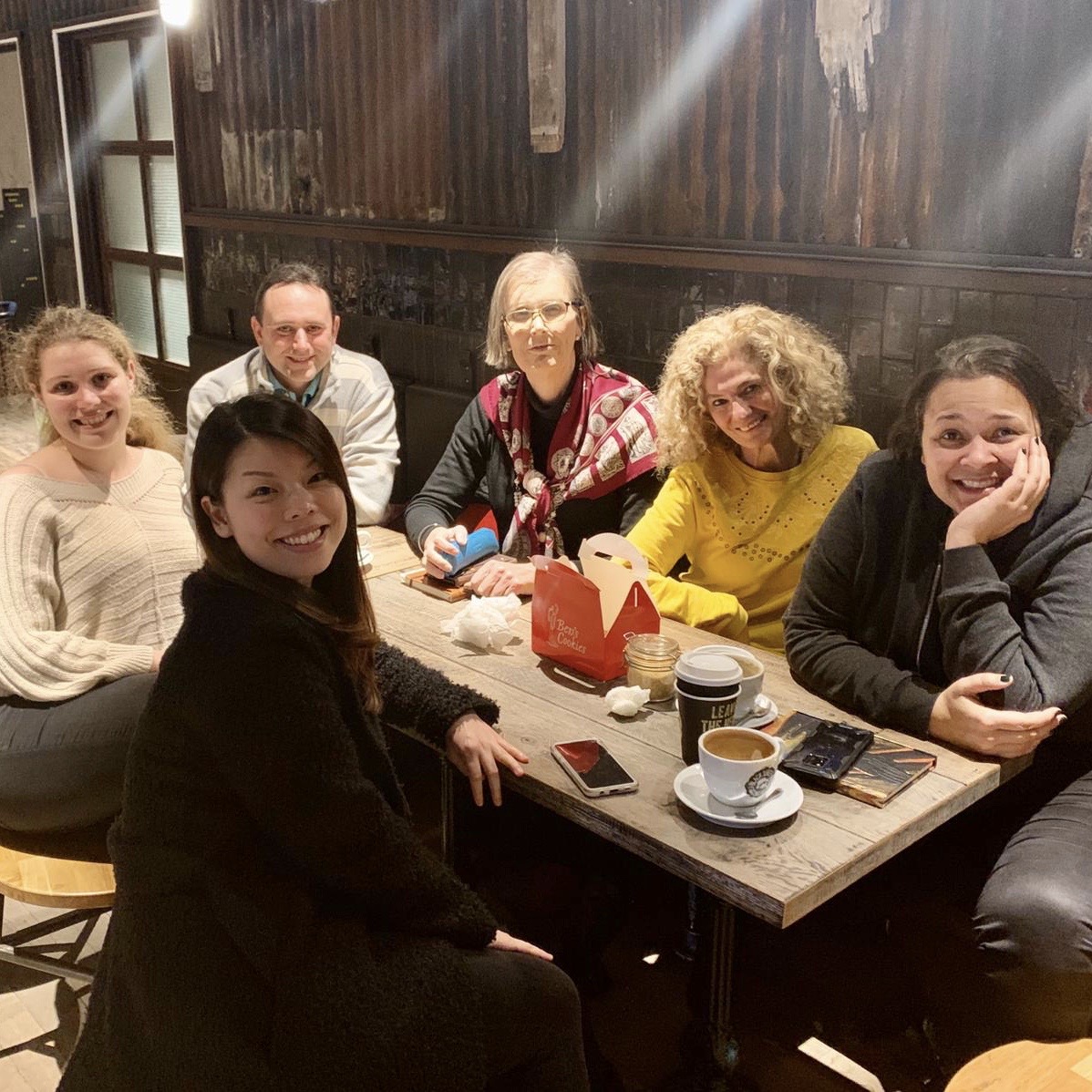 Members of the District 91 conference team meet in person to plan the event in early 2020, before the COVID-19 lockdown.
Members of the District 91 conference team meet in person to plan the event in early 2020, before the COVID-19 lockdown. If you’re organizing a small event, one active District Public Relations Manager might be able to handle the job, but if you’re planning a large event, you’ll need a marketing team. For instance, the D91 Conference had two copywriters for social media posts, one designer for the visuals, one video editor, and a person responsible for the website.
Step beyond digital marketing
Who said you should stop at social media marketing? Consider other options where your event could be found. Here are some examples of creative marketing used by the D91 Conference team:
- One free recording of the event for all club officers for every three members invited.
- Free tickets for any District leader who promoted the event to their members.
- Sales pitch challenge: A group of volunteers outside of the conference team visited clubs and promoted the conference. In turn, they received free professional pitching training and help in developing their pitching skills from some Toastmasters experts.
Some of these strategies turned out to be very successful (incentives), while others were less so (sales pitch challenge), but you won’t know until you try! But find a way to track your marketing performance or you won’t know what worked and what didn’t.
Tip #3: Give it a Professional Feel
Whatever you do, your guests will judge you by your presence. The D91 Conference team worked to maintain a professional look to establish credibility. This included creating a website, avoiding images of poor quality, and having a modern graphic design.
Don’t have the skills to make professional graphics? These days you can make astonishing graphics without any prior experience. A free service that can help is canva.com, which has hundreds of ready-made designer templates. Just switch the fonts and colors to match the Toastmasters brand and you’re good to go! As for high-quality photos, you can use royalty-free photo stocks, such as unsplash.com and pexels.com. Want a webpage but don’t know how to code? There are plenty of website-building platforms that don’t require that knowledge, such as wordpress.com and wix.com.
Tip #4: Master Your Technology
Whatever technology you use, be it the Zoom app for online events or microphones for in-person events, make sure to have tested it plenty of times and let all your presenters check it ahead of time too. Then have a Plan B in case any of your technology fails at the last minute.
For example, to make sure that no one experienced difficulties with tech at the D91 Conference, all presenters and contestants were invited to online sessions with John Drinkwater, the conference’s director of technology, to test web connectivity, microphones, cameras, and lighting well in advance.
Tip #5: Preparation Is Always Key
It might sound obvious, but yes, preparation is the key to success. Rehearse the event before going live. Make sure every person is fully aware of their role on the day and have plenty of backup plans in place.
Being live for two days for nearly 20 hours meant there were plenty of opportunities for things to go wrong, which is why it was rehearsed multiple times. Behind the scenes, we had a backup for every major role.
Tip #6: Keep Experimenting
Finally, whatever you do, keep experimenting! Don’t be afraid to try new approaches, because when one door shuts another one opens. The truth is that the D91 Conference team had no idea if the event would be a success. At that time nobody was even sure that public speaking could be performed online or if Zoom, an app very few people heard of at the time, wouldn’t crash in the middle of the event. Attendees panicked, presenters dropped off, even the leaders were skeptical.
Yet, the team continued to work hard and kept on experimenting. We launched new marketing campaigns, found new presenters, and brought new life to D91 Conference, making it the most memorable D91 event of the year. And you can do the same with your events!
Diana Robertson was the D91 Conference Director in 2020. Born as a shy introvert she is on a mission to help people transform their personalities like she has transformed hers. Today she is a professional Soft Skills Trainer and Founder of Skillsme Soft Skills Academy.
Related Articles

Online Meetings
Meet the Masters of Online Meetings: Part 6
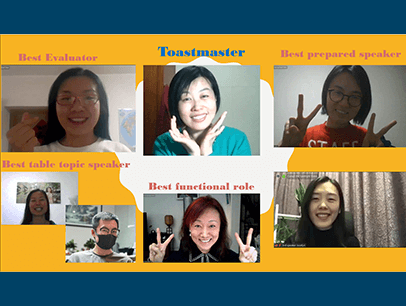
Online Meetings



 Previous
Previous
 Previous Article
Previous Article
